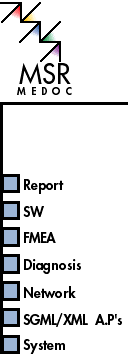

Report
When MSR started to use SGML/XML for
documenting the MSR activities itself, it became clear that a DTD for arbitrary
documents is required. So MSRREP.DTD was developed and can be used to write
reports and specifications not yet covered by the other DTDs (e.g. test reports
etc.)
MSRREP.DTD provides:
- Generic document
structure (chapters, paragraphs etc.)
- Detailed model for change
management
Software
For specifying and documenting software for
electronic control units the MSRSW.DTD is used. This DTD is successfully used
in projects across companies as well as across different business units in one
company while each partner uses different engineering tools and SGML/XML tools.
This DTD is increasingly supported by system design tools (e.g. ASCET/SD
http://www.etas.de).
The DTD covers:
- Data dictionary
- Functional specifications
- Calibration parameters
In one project a single
document of about 1400 of pages as well as on-line documentation was
generated using MSRSW.DTD. Parts were contributed by the different project
partners using different tools. The data was integrated on SGML/XML level and
used not only for document preparation but also for linking engineering tools
(e.g. transferring data definitions).
Software for
ECU’s.
back to top
FMEA
In the area of Failure Mode and Effect
analysis, an experimental DTD (MSRFMEA.DTD) was developed. DTD is not yet
published since it is in a very experimental status.
Its design is totally
database oriented. The data model behind it was directly derived from the data
model of an existing tool for FMEA. This data model was generalized to
eliminate the tool specifics.
The MSRFMEA.DTD will be used in several pilot
projects. After these projects it will be finalized.
back to top
Diagnosis
The latest activity is the documentation
for diagnosis (on board as well as off board). The work started in spring 98.
This domain touches all the other DTDs. So we expect all the information being
available in instances of MSRSYS, MSRNET, MSRSW, MSRFMEA. Nevertheless an
integrated document set for diagnosis is required.
For configuration of off
board test systems, an SGML DTD is defined by ASAP. This DTD is compatible with
the strategies of MSR.
back to
top
Network
For specification and documentation of on
board networks, the MSRNET.DTD is used. It allows to specify
the
information transported on the network, packed these signals into messages the
network topology etc.
This DTD is implemented as import/export facility in
the CAN tools from CAN Vector Informatics
(http://www.vector-informatik.de). It is actually used by a big
automotive manufacturer to support their databases for the next generation of
automotive networks.
back to top
SGML/XML application profile of
MSR
The datamodels
defined for MEDOC are implemented as SGML/XML DTDs. All these MSR DTDs while
implementing specific data models for their domain have the same basic
principles:
- Same link model for all
DTDs (supporting ID/IDREF, HyTime, and MSR semantic addressing simultaneously).
This model allows instances of the various MSR DTDs to be linked together and
used as an entire database. The link classes are unique across the entire MSR
DTD system.
- basic models (generic
text sections, parameters, architectures, etc.)
- configuration
capabilities
- subclassing methods using
< ...class> elements.
- administrative data
applicable to implement version control even for subtrees in one instance. This
is useful if an instance is built of fragments delivered by different project
partners.
- Same generic approaches
for constructing the DTDs (e.g. naming conventions, architectures)
back to top
System
MSR started in the domain of entire
systems. The result is the MSRSYS.DTD.which is used to describe and to specify
entire control systems with all its mechanical and electrical components. This
DTD provides detailed structures for:
- project data
- parts and system decomposition
- architectures with signal, interfaces, ports and connection
specification
- connections
- electrical characteristics
- mechanical characteristics
- optical and acoustical characteristics
- environmental characteristics
This DTD was successfully
used in multiple projects within a big automotive manufacturer and his
suppliers.
back to top